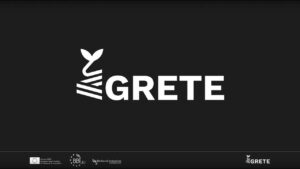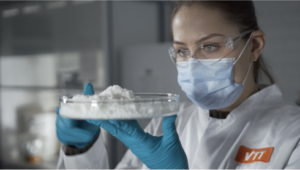Thanks to the BBI JU funding, specific research is made possible in GRETE that will lead to innovation in the wood pulp modification processes and enable functionalised wood-based textile fibres, while reducing the environmental impact for man-made cellulose fibres.
The research activities are carried out by the higher education institutions (HEI) – that are: BOKU, UAVR and UH, and the research organisation VTT. Besides involving their experienced professionals to explore new routes, the GRETE project provides several opportunities to these institutions to train future experts: starting in early 2020, and despite COVID-19, two thesis workers were engaged by project coordinator VTT and were enable to conclude their research leading to a GRETE related master thesis.
Elisa Spönla, chemistry student at University of Helsinki, started her thesis work at VTT in January 2020 investigating enzymatic treatment as a way to modify paper grade pulp to be used as a suitable raw material for the future textile industry. As she states in the abstract of her thesis: “Wood as a raw material is an environmentally friendly option for textile production but its sustainable exploitation is not easy. Currently, ionic liquids are assumed to enable a safe and sustainable process for the production of wood-based regenerated fibres. These processes commonly use dissolving pulp as their raw material but replacing dissolving pulp with a paper grade kraft pulp would decrease environmental impact and production expenses. In this work, molar mass distribution of softwood paper grade kraft pulp was selectively modified using enzymes. Enzymes were utilized instead of acids because of their favourable abilities to selectively modify targeted polymers and to increase fibre porosity.”
Find Elisa’s complete research published here: https://helda.helsinki.fi/handle/10138/318465
Andreas Reipsar, chemical and process engineering student at Åbo Akademi University, focused his research activity at VTT on mass- and energy balances of the Lyocell process, and specifically alternative the NMMO recycling concepts, as the selected reference case for the GRETE concepts.
The largely commercialised Lyocell is a type of man-made fibre that is produced via direct dissolution of dissolving pulp in a non-volatile amine oxide or ionic liquid. The dissolved pulp can be regenerated into long fibre strings by extruding the dissolved mixture into a water bath, where the fibre is washed until the solvent is completely removed. The Lyocell process is known as a sustainable way of producing textile fibres due to its low emissions, water consumption and land-usage. It is distinguished by its very high recycling rate of solvent, which in some cases has been reported to be above 99%. Andreas’ work contributes in analysing the techno-economic viability of the GRETE concepts and evaluating the envisaged solutions. The thesis is currently under evaluation and will be made public by the end of October.
Through GRETE, the young researchers had the chance to experience applied science with a concrete impact and apply their knowledge in an international context that will eventually contribute to their professional path.
Congratulations and best wishes for your carrier from the GRETE consortium!




